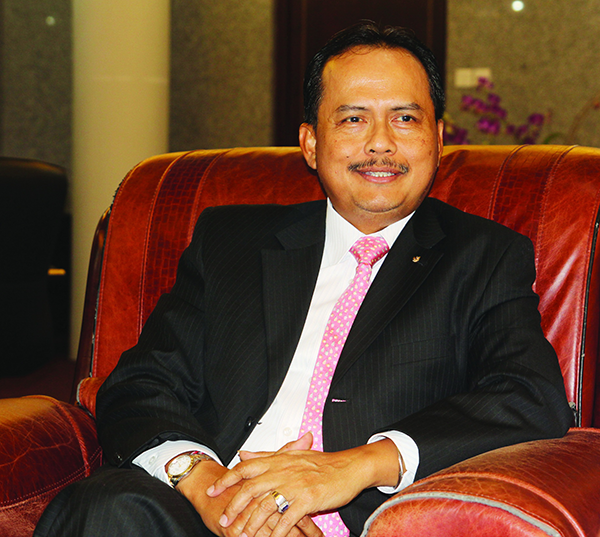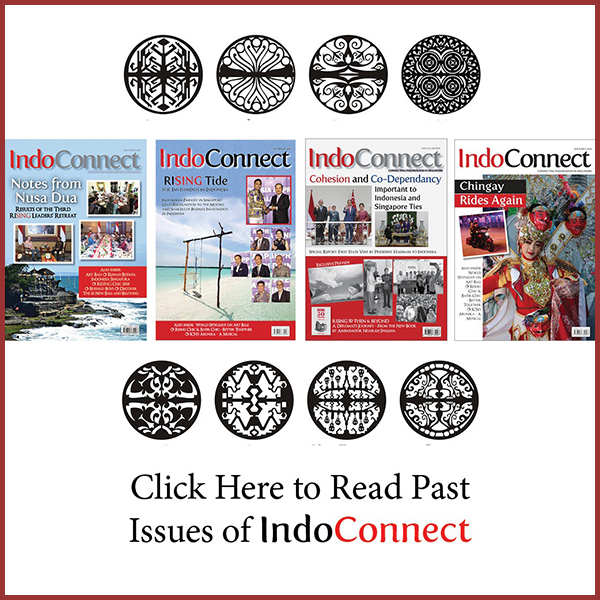H.E. I GEDE NGURAH SWAJAYA INDONESIAN AMBASSADOR TO SINGAPORE
The new Indonesian Ambassador to Singapore H.E. I Gede Ngurah Swajaya, shares his thoughts on a wide range of topics with IndoConnect Publisher and Editor-in-Chief, Mrs Nomita Dhar
Your Excellency, we are very honoured to have an Ambassador with an illustrious career such as yourself to represent Indonesia. We welcome you to Singapore. You have been here slightly over two months, when you were informed about your posting to Singapore, what came to your mind and what preparations did you make?
(Laughs) I first thought about the work ahead – the opportunities and potential in developing ties between our two countries. We already enjoy a history of long term cooperation and when it comes to bilateral trade and economic ties, even if there is a slowdown in the global economy, we see opportunities. I also thought about re-establishing the connections with many of our friends in Singapore. From the minute i arrived, I did not need any special efforts to settle down here thanks to all the help we received from friends and staff in the Embassy.

The Ambassador presenting his credentials to the President of Singapore HE Tony Tan in 25 February 2016
What are the thrust areas that we will see during your tenure in Singapore?
We are already two good neighbours who are making progress in many fields: political, security, economic, social, culture and so on. But there are still plenty of untapped opportunities. For example, I think we can enhance further people-to-people contacts. We tend to take it for granted, being so close, as next door neighbours, being able to visit anytime etc. Efforts that promote subjects of common interests and interaction between Indonesians and Singaporeans can enhance communication and understanding.
There are many connecting factors and similarities between people on both sides, what in your opinion can be done for them to recognize these similarities?
First, of course, is in economic cooperation where we complement each other. This can be done through tourism, which can help Indonesians understand more about Singapore. For Indonesians, we would encourage them not only to see what is happening just along Orchard Road (laughs). There are many other things happening here that is useful for them to know more about.
We also need to change the impressions Singaporeans have about Indonesia, to go beyond “macat” or traffic jams (famous in Jakarta). However, we have also noticed with time, things like the problems of infrastructure represented by the traffic jams are slowly becoming a non-issue with Singaporeans. When they visit Indonesia, they go for the food, shopping, golf and visit scenic destinations such as the Punchak highlands with its mild weather. There are so many attractions so Indonesia is more than just macat. And now there is greater air connectivity with more airlines flying to more destinations there.

His Excellency together with Mrs Nomita Dhar
As for our transportation and infra-structure issues, Singaporeans should understand it is not easy to manage such a large country like Indonesia which is spread across three time zones – it takes eight hours to fly from the western to eastern tips of the country! What we should appreciate is that despite such challenges, Indonesia is still able to contribute to the maintenance of peace and stability in this region and the world.
Ambassador, President Jokowi has introduced many pro-active policies to enhance business and cooperation, how can these be tapped?
It has been a year since President Jokowi took office and he has shown he really means business. Many measures have been introduced to improve the ease of doing business. In the short time I have been here I have received very positive impressions from Singaporeans that Indonesia is changing. Yes, we still have challenges but the country is enjoying increased dynamism in economic growth and business people and investors are responding positively to this. I would like to improve people’s understanding of those changes.
For example, in the last few months the President has been inaugurating a new airport almost every month! For seaports we now have over 1,000 operating all around Indonesia. So when President Jokowi declared Indonesia a maritime nation, it was not only a declaration but he has taken concrete steps to make it a reality. The rate of development is taking place at a great speed and scale. Improvements in air and sea connectivity will have a huge impact on the economy. Earnings from Indonesia’s maritime sector doubled in 2015 from increases in cargo and passenger traffic.
What is your message to people in the shipping sector on the upcoming opportunities due to the recent policy changes to make it easy for marine tourism i.e. visiting yachts and cruise ships to Indonesia?
Well, I would like to tell them that the potential is there. In terms of networking opportunities and capabilities, Singapore on its side has great expertise in port and maritime management, so I do not see why we cannot combine to create a win-win partnership.
As Indonesia’s first Permanent Representative, Ambassador Extraordinary and Plenipotentiary to ASEAN, you bring valuable experience on intra-ASEAN relations. As Indonesia’s ambassador here, how can you use it as an advantage to leverage on Singapore and Indonesia ties?
I always like to share the knowledge that I have and I have learnt how important it is to listen to everyone. As Indonesia’s Permanent Representative, I have always worked towards bringing member nations closer together by increasing interaction among the 10 countries. It is also important to raise the awareness of ASEAN as a COMMUNITY to the world and the population of all member countries. That is why in the past, whenever possible, I would give public talks or lectures in universities in Indonesia and countries such as Australia and the US as well publish articles in newspapers and journals. It’s my small contribution but I think it helps.
ASEAN is now becoming a community, and it is the responsibility of everyone to be active and participate in raising awareness of this community. There are many benefits, for example, ASEAN has made great strides working together in the area of security. In trade, ASEAN is the world’s most dynamic growth area outstripping Europe and the Americas. There are challenges too, but as long as we stick together, remain united and cohesive despite the periodic differences we might have, we can overcome difficult situations in the future.
“Singaporeans should understand it is not easy to manage such a large country like Indonesia which is spread across three time zones – it takes eight hours to fly from the western to eastern tips of the country! What we should appreciate is that despite such challenges, Indonesia is still able to contribute to the maintenance of peace and stability in this region and the world.”

Indonesia has a large population base and not all have access or enjoy a good standard of living. What is happening to improve the lot of this segment of the populace?
Indonesia is a major contributor to the UN peace-keeping forces and is also active in promoting prosperity, by solving problems that the international community faces such as food security, energy security et al. We are positive players who can contribute and we are a responsible member of the global community. One of our priorities is to actualise the human potential in our country, which can be realised through cooperation with others. That is why President Jokowi is sending a message that we are open to cooperation with other nations in the region and in the international community as long as it results in the betterment of the people.
Singapore is popular with Indonesians not only as a tourism destination but also for Medical and Education services and facilities. How can Indonesia tap into this flow?
Yes, many of these hospitals even have representatives in major cities. But it is impossible to have 250 million people come to this island for their medical needs. The hospitals should take the next step and establish facilities in Indonesia. Pak Jokowi has already put in place universal access to health services and this is a sector that is booming in Indonesia. Singapore healthcare companies should seize this opportunity and capitalise on their niches in this market. There are already some tie-ups already in place between Indonesian and Singapore hospitals. The potential for growth is tremendous when it comes to improving our healthcare infrastructure and capacity. This is something that can be applied to the education sector too. We would welcome collaborations between the established universities in Indonesia and educational institutions in Singapore.
Singaporean consumers are fussy about the source of their fresh produce. Is there an opportunity here for Indonesian exports especially in fresh vegetables and fruits?
Our geographical proximity gives us a big advantage. What we are doing now is to improve the yield and capacity of our farmers. This coupled with our strengthened maritime network, will definitely see an increase in the availability of Indonesian fresh produce on Singapore market shelves.
Fishery is another industry that has great potential. Previously, we lost about US$20 billion in revenue because of illegal fishing. We are addressing that problem. The government has also issued a new package of investment regulations that allow 100 per cent foreign direct investment in this sector. Cold storage and fish processing facilities would also be needed so there are many areas Singapore investors can look at in the fishing and agricultural sectors.
What is your wish for students coming here (either as scholars or privately) for studies?
Once they have graduated (and for some after they have served their bond) I hope they not only consider working for others but also build on their skills to return and help create entrepreneurial opportunities. This is especially so thanks to the growth of knowledge industries that uses information technology, social media and the Internet.
Are there any new initiatives in promoting the Batam-Bintan-Karimun growth triangle?
We are revitalizing our efforts by establishing a working group consisting of a new team of professionals that is looking into this and ironing out the problems that is hindering investments. In Batam, for example, we have consolidated into a single authority (before there were two) to help potential investors, remove areas of duplication and improve bureaucratic efficiency. We want to see more companies moving into the enclave and develop it further for tourism and business. The government has also helped by providing clear guidelines on wages with a formula that will help employers in budgeting for wage costs two to three years ahead.
How about the scourge of corruption – what is the progress on this front?
No country is immune from corruption. Indonesia has shown it is serious in its anti-corruption efforts as we have carried out enforcement action right up to prominent leading figures as a deterrent. It is still happening but it has been reduced. One additional and very effective weapon we now have that keeps corruption in check is the part played by social media and the mass media who help identify officials who abuse their power. It will be some time (to reduce corruption) but we have started creating a sense of good clean governance.
Have you any good news to share about the haze issue this year?
Let me emphasise that the Indonesian government is committed to tackling this issue – not because of pressure from the international community – but because Indonesian citizens are the ones who suffer the most. The haze brings much suffering and we spend billions on extinguishing the fires; there is a great loss in economic potential and most tragically, there was also loss of lives. Pak Jokowi went to see for himself the effects of the haze and has directed government resources be channelled into preventive measures such as managing the peat land. As we enter the dry season we have posted the armed forces in the region. As the area to be covered is so large, we are also investing efforts to raise awareness of the problem throughout community as prevention is very critical in controlling the outbreak. Legal action has also been brought against companies clearing the forest by burning.

H.E. Gede Ngurah then – the young scholar who gave the valedictorian speech upon graduation from Udayana University.
PRIVATE SIDE
What do you do during your free time?
Playing golf, gives me some peace of mind and break from work. In Jakarta, I sometimes golf with my fellow ASEAN ambassadors for charity and networking. Unfortunately, in the past I did not spend as much time with my children because of work. For example, when I was in New York (1999 to 2003) as Indonesia’s Permanent Representative to the United Nations by the time I reach home it was late and the children have fallen asleep. By the time I wake up next morning they already have gone to school. My advice to all parents, please learn from my experience and make as much time as you can for your children. You are going to miss them and all the opportunities to spend more time with your children*.
I was fortunate that I was born in Bali. I feel Balinese people have a special bond with nature – it is part of our cultural identity which is already very unique. Foreigners also find the island different as it exudes a special atmosphere and they feel different when they are there. This has contributed to the growth of tourism but we should not be complacent. I hope Bali can retain that feeling. For example, we have introduced rules to regulate the height of buildings (except for some hotels in Nusa Dua which were built before the introduction of the rule) – they cannot be higher than the height of the tallest coconut trees. The Balinese have a philosophy in life called tri hita karana meaning the “three causes of well-being.” They are to attain harmony among people, with nature (or environment) and with God.
Very soon it will be Hari Kartini, what are your thoughts about the contribution of women today in Indonesia?
They have made great contributions – we even had a female president! So I believe gender equality and rights is not an issue in Indonesia. There has been great progress made in education too. At the same time, Indonesian women play a major role in contributing to the nurturing of the family. My wife has played a big role in my life and career. We first met and studied in Udayana University** in Bali. She did better than me in academic grades and I like to think she made a smart choice in a life partner (smiles).
Editor’s notes:
*The Ambassador has two grown up children now working in the private sector. **He majored in law at Udayana, a top Bali university from 1981-1986 and later received his master’s degree as Master of Arts (MA), from the Fletcher School of Law and Diplomacy, Tufts University, Boston, MA, USA.








